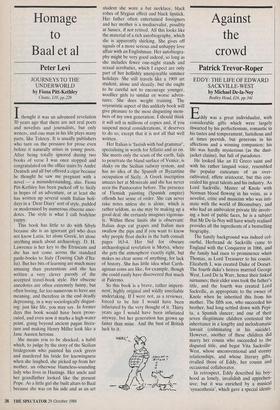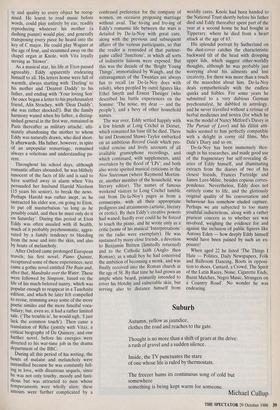Against the crowd
Patrick Trevor-Roper
EDDY: THE LIFE OF EDWARD SACKVILLE-WEST by Michael De-la-Noy
Bodley Head, f16, pp.341
Eddy was a great individualist, with considerable gifts which were largely thwarted by his perfectionism, romantic in his tastes and temperament, fastidious and at times peevish, but generous in his affections and a winning companion; his life was hardly mysterious (as the dust- jacket claims), but full of paradoxes.
He looked like an El Greco saint and with his rather languid voice, resembled the popular caricature of an over- cultivated, effete aristocrat, but this con- cealed his great talents and his industry. As Lord Sackville, Master of Knole with Norman blood flowing in his veins, as a novelist, critic and musician who was inti- mate with the world of Bloomsbury, and who had an ambivalent private life involv- ing a host of public faces, he is a subject that Mr De-la-Noy will have wisely realised provides all the ingredients of a bestselling biography.
The family background was indeed col- ourful. Herbrand de Sackville came to England with the Conqueror in 1066, and the family had risen to prominence when Thomas, as Lord Treasurer to his cousin, Elizabeth I, was created Duke of Dorset. The fourth duke's heiress married George West, Lord De la Warr, hence their linked surnames; their elder sons took the father's title, and the fourth was created Lord Sackville, as appropriate to the owner of Knole when he inherited this from his mother. The fifth son, who succeeded his brother, had long settled down with Pepi- ta, a Spanish dancer; and one of their seven illegitimate children contested the inheritance in a lengthy and melodramatic lawsuit (culminating in his suicide). However, another of these children did marry her cousin who succeeded to the disputed title, and begat Vita Sackville- West, whose unconventional and stormy relationships, and whose literary gifts, rivalled those of Eddy, her cousin and occasional collaborator.
In retrospect, Eddy described his boy- hood as lonely, invalidish and apprehen- sive; but it was enriched by a musical `synaesthesia', which gave a special identi-
ty and quality to every object he recog- nised. He learnt to read music before words, could play entirely by ear, readily reproducing whatever his mother (a dashing pianist) would play, and generally transposing every piece he heard into the key of C major. He could play Wagner at the age of four, and strummed away on the chapel organ at Knole, with Vita loyally serving as 'blower'.
As a musical star, his life at Eton passed agreeably, Eddy apparently endearing himself to all. His letters home were full of warmth, always starting with 'Darling' to his mother and 'Dearest Daddy' to his father, and ending with 'Your loving Son' (he once began a letter to his psychoanalyst friend, Alix Strachey, with 'Dear Daddy'; she was rather shocked!). But the family harmony waned when his father, a disting- uished general in the first war, remained in Paris thereafter as military attache, ulti- mately abandoning the mother to whom Eddy was naturally drawn, who died short- ly afterwards. His father, however, in spite of an unpopular remarriage, remained always a solicitous and understanding pa- rent.
Throughout his school days, although romantic affairs abounded, he was blithely innocent of the facts of life and is said to have scuttled away in alarm when Vita persuaded her husband Harold Nicolson (15 years his senior), to break the news. Perhaps Harold was rather inept, as he instructed his elder son, on going to Eton, to put off masturbation 'as long as he possibly could, and then he must only do it on Saturday'. During this period at Eton Eddy was often assailed with ill health, much of it probably psychosomatic, aggra- vated by a family tendency to bleeding from the nose and into the skin, and also by bouts of melancholy.
After Oxford came prolonged European travels; his first novel, Piano Quintet, recaptured some of these experiences; next came a gothic novel entitled The Ruin and, after that, Mandrake over the Water. These were followed by Simpson, based on the life of his much-beloved nanny, which was popular enough to reappear in a Tauchnitz edition, and which he later felt compelled to revise, trimming away some of the more poetic similes and the more fanciful voca- bulary; but, even so, it had a rather limited sale. (`The trouble is', he would sigh, 'I just lack the common touch'). Then came a translation of Rilke (jointly with Vita), a critical biography of De Quincey, and one further novel, before his energies were diverted to his war-time job in the drama department of the BBC.
During all this period of his writing, the bouts of malaise and melancholy were intensified because he was constantly fall- ing in love, with disastrous sequels, since he was not only touchy, moody and fasti- dious but was attracted to men whose temperaments were wholly alien; these amours were further complicated by a confessed preference for the company of women, on occasion proposing marriage without avail. The to-ing and fro-ing of Eddy's romantic life between the wars is detailed by De-la-Noy with great care, along with the previous and subsequent affairs of the various participants, so that the reader is reminded of that parlour- game called `Junctions', in which all sorts of indiscrete liaisons were exposed. But this was the decade of the 'Bright Young Things', immortalised by Waugh, and the extravagances of the Twenties are always fun to recall (as De-la-Noy does with relish), when peopled by outré figures like Ethel Smyth and Ernest Thesiger (who described his battle experiences on the Somme: 'The noise, my dear — and the people'), and a bevy of other household names.
The war over, Eddy settled happily with a few friends at Long Crichel in Dorset, which remained his base till he died. There he and Desmond Shawe-Taylor embarked on an ambitious Record Guide which pro- vided concise and lively accounts of all available gramophone recordings, and which continued, with supplements, until overtaken by the flood of `LPs'; and both also wrote spirited musical criticisms in the New Statesman (where Raymond Mortim- er, another member of the household, was literary editor). The names of famous weekend visitors to Long Crichel tumble out from De-la-Noy's pages as from a cornucopia, with all their appropriate pedigrees and attainments (artistic, literary or erotic). By then Eddy's creative powers had waned; hardly ever could he be forced to touch the piano, and he wrote only as a critic (some of his musical 'Interpretations' on the radio were exemplary). He was sustained by many close friends, a devotion to Benjamin Britten (limitedly returned) and to the Catholic faith (Anglo- then Roman); as a small boy he had conceived the ambition of becoming a monk, and was finally received into the Roman church at the age of 58. By that time he had grown an ample white beard, primarily intended to cover his blotchy and vulnerable skin, but serving also to distance himself from
worldly cares. Knole had been handed to the National Trust shortly before his father died and Eddy thereafter spent part of the year at a second home he had bought in Tipperary, where he died from a heart attack at the age of 63.
His splendid portrait by Sutherland on the dust-cover catches the characteristic backward tilt of the head with drooping upper lids, which suggest other-worldly thoughts, although he was probably just worrying about his ailments and lost creativity, for there was more than a touch of the masochist about him. De-la-Noy deals sympathetically with the endless quirks and foibles. For some years he submitted to a very dubious German psychoanalyst, he dabbled in astrology, and he never travelled without a retinue of herbal medicines and nostra (for which he was the model of Nancy Mitford's Davey in The Pursuit of Love) and his elitist atti- tudes seemed to him perfectly compatible with a delight in corny old films, Mrs Dale's Diary and so on.
De-la-Noy has been immensely thor- ough in his researches, and made good use of the fragmentary but self-revealing di- aries of Eddy himself, and illuminating extracts from the diaries of two of his closest friends, Frances Partridge and James Lees-Milne, besides copious corres- pondence. Nevertheless, Eddy does not entirely come to life, and the gloriously original quality of his conversation and behaviour has somehow eluded capture. Perhaps we are subjected to too many youthful indiscretions, along with a rather prurient concern as to whether sex was involved, weighing the evidence for and against the inclusion of public figures like Antony Eden — how deeply Eddy himself would have been pained by such an ex- posure!
When aged 22 he listed 'The Things I Hate — Politics, Daily Newspapers, Folk and Ballroom Dancing, Boots in opposi- tion to shoes, Custard, a Crowd, The Spirit of the Latin Races, Noise, Cigarette Ends, Burnt Matches, Negro Music, Strangers on a Country Road'. No wonder he was endearing.



























































 Previous page
Previous page